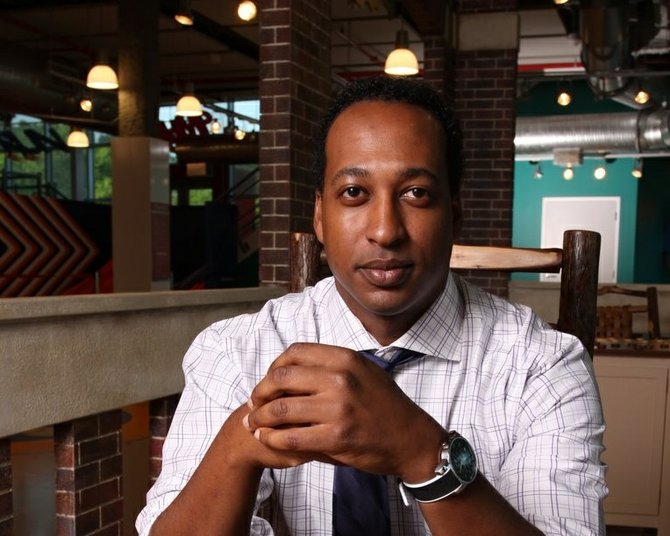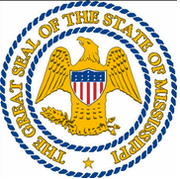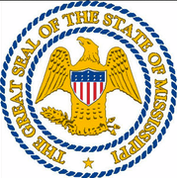Melvin Priester Jr., son of a Hinds County District Judge, is running for city council in Ward 2. Photo by Trip Burns.
Attorney Melvin Priester Jr. first dove into politics when he helped manage his father's campaign for Hinds County Court Judge in 2010. Melvin Priester Sr. won that election. Now, Junior is following with a bid for the Jackson City Council seat for Ward 2.
Priester spent four years after graduating from Stanford Law School working at a San Francisco firm before returning to Jackson. He said the move was gradual, as he began coming back to Jackson for weeks at a time in 2008 to help care for his then-99-year-old grandmother. In 2010, that move became permanent.
Since deciding to run for city council, Priester said he has turned his attention to neighborhood associations. He said he has visited with one to two community groups every day for weeks, gauging what people want to see from local government. Priester said he sees a need for the city to make the process of taking over abandoned properties easier and to allow community organizations to get involved in the process.
The Jackson Free Press caught up with Priester at his family's law firm, where he works.
Priester said he'd also like to see the city's 3-1-1 system allow citizens to track other people's complaints and issues. He also said he wants to see the city open Lake Hico to the public. The lake, located off Northside Drive, was closed to the public in 1968, shortly after black people began to use it. Jackson Public Schools own the land, and currently lease Lake Hico to Entergy Mississippi as a cooling pond. Priester believes it is time to reopen the lake to bring Jacksonians together.
It's that type of connectedness and openness that Priester wants to help bring to the city.
What did you learn while living in San Francisco that you think could work in Jackson?
I think I've learned in San Francisco how better to appreciate what we have in Jackson. The process of me moving back to Jackson, it wasn't like I picked up one day and moved back to Jackson. My grandmother was 99, and she was bed-ridden. So I started to come back in extended streaks: a couple of weeks here and there, to help take care of her.
When I came back, I'd go to things like the North Mid-Town Arts Center, or Seven Studios. Being in a place like San Francisco, where you do literally have some of the best artists or musicians and cultural things in the world, you get an eye where you can go, "Oh my god, the things that are going on here are just as world-class."
Jackson, for a city of 170,000 people, has an absolutely world-class arts and culture scene. It's an amazingly collaborative group of people who work very hard to not be bound by genre or racial background. It's a real example of when people work together.
Being in San Francisco gave me the confidence to (say), "I want to be associated with these people, because what they are doing here is just as good as what they are doing in the Bay Area." Now, there are fewer people doing it, so you may not get to have the volume of activity, but you have the parts there. Learning how to appreciate that is one of the main things I learned in San Francisco.
The other things that I'd say I learned in San Francisco, in terms of politics and governance, specifically, is the extent to which it's possible now to make government very user-friendly for people. It goes from a variety of things: from just simply turning parking meters to devices that can take credit cards so people are willing to pay to park instead of just walking off because they don't have change; to making sure that any city service that needs to be accessed can be accessed online, and (that it has) a well-done web page.
I think one of the things that really frustrates a lot of people that are trying to do things in Jackson, is that they often (say), "I would do it legally if I just knew how to do it right." That is an area that can be mined effectively. If we can make certain online resources of Jackson more dynamic, I think it would help people do a lot.
If you are elected, day one, what is your first priority?
My first priority is if I have to buy the asphalt myself, I'm going to fix some of the potholes on Hanging Moss (Road). I don't mean that to be flippant.
The mayor indicated that he is trying to do a new bond issue to get some of the streets repaved. This winter has been particularly bad for potholes. It's something that very adversely impacts, in a very concrete way, a lot of people's lives. A lot of people are getting their cars messed up because of these potholes.
I would particularly like to see if this bond issue moves forward as indicated. I would like to make sure that we put in a very transparent and accountable measure for ranking which potholes get fixed first and which roads get fixed first.
There's a perception, rightly or wrongly, that certain parts of town gets more attention that other parts of town. I think it's important for us to develop and have procedures in place so that we make sure that Ward 2 is getting as much attention on the road front as Ward 1 and Ward 7, etcetera.
I also would, on election day, make it a real priority to work with either whoever will become the new mayor, or assuming Mayor (Harvey) Johnson (Jr.) wins, working with his office to make sure that we roll back the lack of civility that I think has taken root at City Hall.
I think one of the reasons we have situations like we had with Sam's (Club announcing it is moving out of the city) is that people either aren't talking to each other enough, or they're not talking to each other enough in a civil manner. People on city council right now often complain that the mayor doesn't let them have access to department heads. He wants city council people to go through the mayor's office. We need to be able to talk to each other. We need to be able to be a team.
Why is this a problem for the Council?
Because we have a strong-mayor, weak-council form of government, that often causes some tension between people. I think what we, as city councilmen, have to do is recognize our role. We are a legislative body, but we are also ambassadors for this city.
I've talked to members of the Mississippi Delegation to the state Legislature, and they often talked about how we sometimes shoot ourselves in the foot, in terms of getting things from the state, because we're not able to present our city leadership as organized, as a team, as a competent body. That has to stop.
We have for too long fought old fights. We see ourselves in battle with Madison or Clinton or the rest of Hinds County. We see ourselves in battle with the state Legislature, because of current acts and because of historic acts. At the end of the day, the way you get out of hole is: You've got to stop digging. You've got to start saying: "I'm going to keep in mind how we got here, so I don't make the same mistakes over again, but we're going to turn a new page. We're going to be on the same page, and not sort of have these public squabbles that we have had before."
Give me an example.
For example, we had one member of the city council a couple months ago when the State Fair was in town trying to post a resolution just thanking the State Fair for being in town. (That was) one of those simple business things you do, where some entity comes in and spends a bunch of money in our city, and we go, "Thank you for being here. This is State Fair Day by resolution of the City Council."
That resolution came up, and it ended up being a big argument between all these members as to whether the State Fair was paying its fair share or not, whether or not the State Fair had done enough to make up for the fact that it used to be a segregated State Fair. It was the sort of thing where, if you're going to do something like that, why don't you call around before you float that resolution. It's the sort of thing where it's superfluous to do it, but it's worse if you can't get a 7-0 vote.
That, to me, is one of those indicators of the extent to which (the city council) could talk to each other more before we do things publicly, in order to make sure that the image that we put out is the best image for Jackson. Unfortunately, we've got to dig ourselves out of the hole of bad perception.
I love Jackson. I genuinely love Jackson. I am so happy to be in Jackson, but rightly or wrongly, we've got a reputation of being dangerous, or being not a good place for business. Those are the things that we are going to have to unwind through being extra professional in the way we operate.
Jackson is constantly battling a high-crime perception. What does the city need to do to change that.
One of the reasons that I want to run is that Jackson, specifically, and Hinds County, generally, are on the verge of needing to make some very serious and very expensive decisions about our criminal-justice system. We can't maintain the status quo, because, unfortunately, we have got some serious issues with regards to the Hinds County Detention Center. That is throwing a major monkey wrench into our criminal justice system.
We either need to pay up to build a new facility that is larger, or we need to radically reconsider things in terms of prosecuting drug crimes, in terms of juvenile offenses, and status crimes, in terms of dealing with homelessness. We have, unfortunately, let jail be the way that we deal with a lot of mental-health issues. It's too expensive for us to keep doing that.
Although people want to hear you say, "I'm going to lock up everybody and throw away the key. I'm going to make sure that we have bails, like in Madison, that are million-dollar bails for stealing a pack of gum." Those aren't realistic solutions.
What are realistic solutions?
Realistic solutions are to make a commitment to either building a new jail, expanding the old jail, or start looking into things like alternative sentencing. We also have to accept that the way we're going to deal with crime is going to entail doing things like working with neighborhood associations that are willing to do the work--things like citizens on patrol and trying to expand programs like that.
I'll go back to the example of the neighborhood I live in, Woodhaven. Our neighborhood has a very active citizens-on-patrol program. I think we need to expand programs like that. My neighborhood spends something like $1500 a year just on gas donations for our volunteer citizens on patrol.
That's why I say it's so important for the city to shore up activities of neighborhood associations. Private citizens are doing the sort of things that have been shown to work to reduce crime, such as having citizens on patrol programs. They just need help to make sure that they get the training to do it, that they know how to work with the local law enforcement when they see something, and that the city is doing what it can to help them. For example, increase the membership in their neighborhood.
In the neighborhood I live in, out of the 600 houses, 300 houses are members (of the association). If we can work to get it from 300 to 450, that's organizing a neighborhood.
That's what, I think, Jackson's got to work hard to improve. The best resources that we have are our people. A lot of people in Jackson feel like they can't reach the city, that the city is ignoring them, and that they're not getting the support from the city to do the basic things that they want to do to improve the city. The job of the city council, and what I would focus on, if elected, is trying to figure out how to give aid where aid would be appreciated, and help the city get out of the way when (they aren't) getting out of the way.
Comment at www.jfp.ms. Email Jacob D. Fuller at jacob@jacksonfreepress.com.
Corrections: An earlier version of this story incorrectly spelled Priester's name in the title. It also stated that Priester worked at the San Francisco law firm for six years. He worked there for four. Neither mistake made it in the print edition of the Jackson Free Press. The Jackson Free Press apologizes for these mistakes.
Melvin Priester Jr.
Running for: Ward 2 City Council
Age: 34
Political experience: Helped coordinate his father’s judicial campaign in 2010
Education: Murrah High School 1997; Harvard University 2001, bachelor’s in social studies; Stanford Law School 2004
Profession: Lawyer at Priester Law Firm
Family: Single; Father is Hinds County Judge Melvin Priester Sr.





Comments